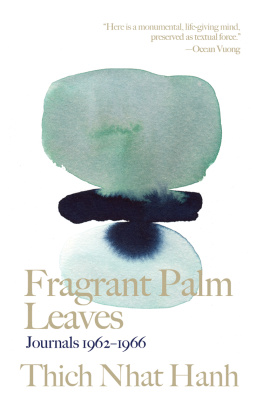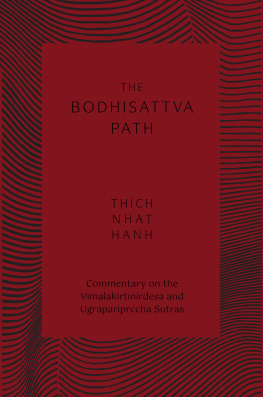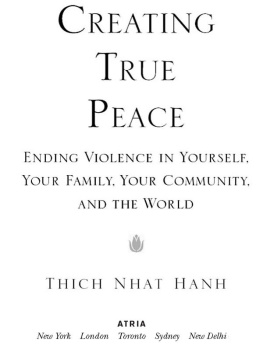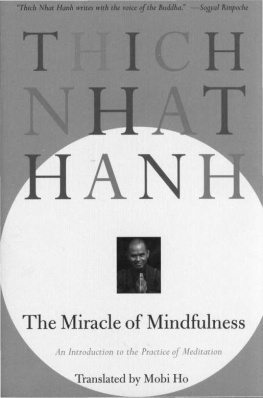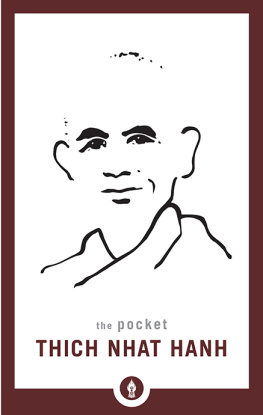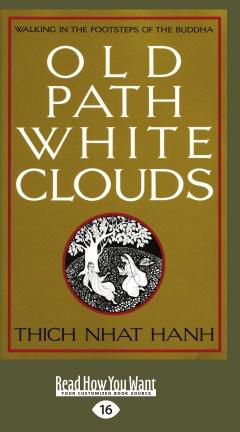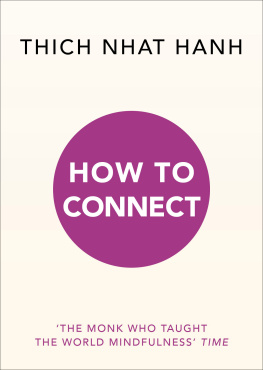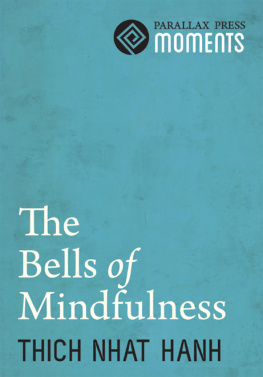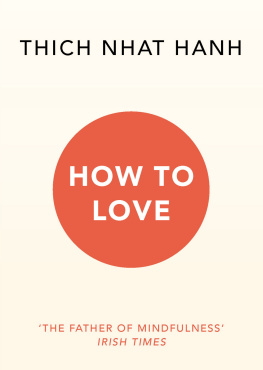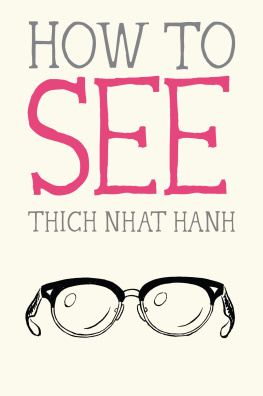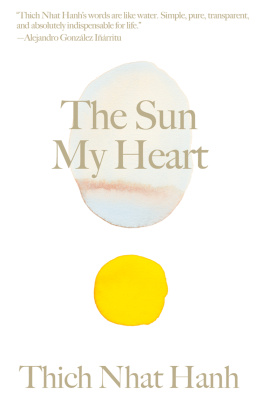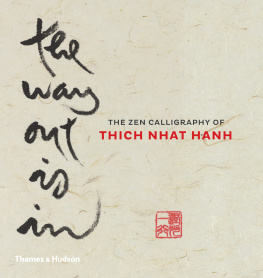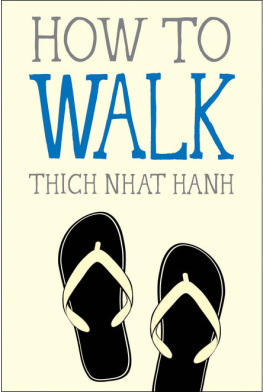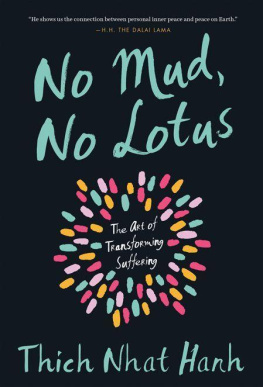Thich Nhat Hanh - Fragrant Palm Leaves: Journals, 1962-1966
Here you can read online Thich Nhat Hanh - Fragrant Palm Leaves: Journals, 1962-1966 full text of the book (entire story) in english for free. Download pdf and epub, get meaning, cover and reviews about this ebook. year: 2020, publisher: Parallax Press, genre: Non-fiction. Description of the work, (preface) as well as reviews are available. Best literature library LitArk.com created for fans of good reading and offers a wide selection of genres:
Romance novel
Science fiction
Adventure
Detective
Science
History
Home and family
Prose
Art
Politics
Computer
Non-fiction
Religion
Business
Children
Humor
Choose a favorite category and find really read worthwhile books. Enjoy immersion in the world of imagination, feel the emotions of the characters or learn something new for yourself, make an fascinating discovery.
- Book:Fragrant Palm Leaves: Journals, 1962-1966
- Author:
- Publisher:Parallax Press
- Genre:
- Year:2020
- Rating:3 / 5
- Favourites:Add to favourites
- Your mark:
- 60
- 1
- 2
- 3
- 4
- 5
Fragrant Palm Leaves: Journals, 1962-1966: summary, description and annotation
We offer to read an annotation, description, summary or preface (depends on what the author of the book "Fragrant Palm Leaves: Journals, 1962-1966" wrote himself). If you haven't found the necessary information about the book — write in the comments, we will try to find it.
Fragrant Palm Leaves: Journals, 1962-1966 — read online for free the complete book (whole text) full work
Below is the text of the book, divided by pages. System saving the place of the last page read, allows you to conveniently read the book "Fragrant Palm Leaves: Journals, 1962-1966" online for free, without having to search again every time where you left off. Put a bookmark, and you can go to the page where you finished reading at any time.
Font size:
Interval:
Bookmark:

The monk who taught the world mindfulness.
TIME
Thich Nhat Hanh shows us the connection between personal inner peace and peace on earth.
His Holiness the Dalai Lama
Thich Nhat Hanh is a holy man, for he is humble and devout. He is a scholar of immense intellectual capacity. His ideas for peace, if applied, would build a monument to ecumenism, to world brotherhood, to humanity.
Dr. Martin Luther King, Jr.
Thich Nhat Hanhs work, on and off the page, has proven to be the antidote to our modern pain and sorrows. Here is a monumental, life-giving mind, preserved as textual force. And that's what I feel reading and practicing his teachings: that I am being acted on by a compassion equal to and pervasive as gravity itself. His books help me be more human, more me than I was before.
Ocean Vuong, author of On Earth Were Briefly Gorgeous
One of the sweetest and most personally revealing of Thich Nhat Hanhs books, it shows the planting of his seeds of remarkable wisdom.
Jack Kornfield, author of A Path with Heart
Enlightening... To read his thoughts is to understand the connection between public life and private life, and that such interbeing makes for ecstatic joy.
Maxine Hong Kingston, author of The Woman Warrior
Thich Nhat Hanh is a great teacher. I have studied him, his work, his passage through life, with gratitude and joy. Through his writings, his public offerings, his insights, Ive gained vision and clarity; Ive often felt it would be impossible to find a more lucid, determined, and courageous soul.
Alice Walker, author of The Color Purple
Thich Nhat Hanh is among the most revered leaders in the world. His teachings and mindfulness practices have deeply influenced my journey through life. He is a torch of wisdom lighting the path ahead, generating the compassion, love, and understanding we need to create peace for ourselves and the world.
Marc Benioff, chair and CEO, Salesforce
Thich Nhat Hanh does not merely teach peace; Thich Nhat Hanh is peace.
Elizabeth Gilbert, author of Eat, Pray, Love
Thich Nhat Hanh's words are like water. Simple, pure, transparent, and absolutely indispensable for life.
Alejandro Gonzlez Irritu, director of Birdman and The Revenant
How is it that a Vietnamese Buddhist monk who teaches mindfulness could inspire Martin Luther King and become one of the great nonviolent activists of the twenty-first century? Like no other teacher, Thich Nhat Hanh shows us the revolutionary possibilities of building social movements based on compassion, for both ourselves and others.
Professor john a. powell, director of the Othering & Belonging Institute at UC Berkeley
I first met Thich Nhat Hanh in 1968 in Paris. That was the time of rising counterculture, protest against the Vietnam War and student uprising. At that time his presence in Paris was like a soothing rain in dry heat. Ever since, for more than fifty years, he has been the conscience of humanity. He has been a compassionate catalyst of spiritual awakening, social harmony, and ecological awareness. He has nurtured the human spirit with dedication, determination, and delight. He is humble and gentle yet powerfully persuasive and strong-willed. It has been a joy of my life to know him and follow his teachings.
Satish Kumar, editor emeritus of Resurgence & Ecologist magazine and founder of Schumacher College
One of the greatest teachers of our time... In Fragrant Palm Leaves, the venerable poet emerges poignantly disclosing the essence of enlightenment, and also life itself!
Robert Thurman, author of Inner Revolution
Informative and inspiring.
Publishers Weekly
Parallax Press
PO Box 7355
Berkeley, California 94707
www.parallax.org
Parallax Press is the publishing division of Plum Village Community of Engaged Buddhism, Inc.
Copyright 1998, 2020 by the Plum Village Community of Engaged Buddhism, Inc.
Translation 1998 by Mobi Warren
First Parallax Press hardcover edition published in 1998
First Riverhead trade paperback edition published in 1999
Second Parallax Press hardcover edition published in 2020
All rights reserved
Printed in Canada on 100% postconsumer recycled paper
Cover and text design by Katie Eberle
Composition by Happenstance Type-O-Rama
Cover art by Kelly Witmer
ISBN: 978-1-946764-72-0
LCCN: 2020029158
V enerable Thich Nhat Hanh is a respected elder spiritual brother. We have both been monks from an early age and we are dedicated to encouraging compassion and love, with the aim of making our world a more peaceful and harmonious place.
The journals compiled in this volume, entitled Fragrant Palm Leaves, are a beautiful window into the thoughts and feelings of a Buddhist practitioner. Though written at a time of war and unrest in his country, they express optimism and friendship, reflecting his love of his country and of his brothers and sisters there. The book is an ode to Vietnam, from which he was formally exiled in 1966, and only able to return to in 2005.
In expressing, peace in oneself, peace in the world, Venerable Thich Nhat Hanh is conveying that to create a peaceful world we must cultivate peace and love within ourselves. To do this we must counter our selfish tendencies towards desire, jealousy, and anger. This is not an easy task; however, it is essential if we expect to achieve the peaceful and happy environment we wish for.
Venerable Thich Nhat Hanhs effort to reach a global ethic, beyond religion, is a goal I share. I am hopeful that modern education will place greater emphasis on methods for developing compassionate and loving qualities that we can apply to our lives and careers.
Today, as we face existential challengessuch as global warming and the widening gap between rich and poorit is essential that our schools cultivate positive values in our youth in order to help them develop the skills needed to face the enormous challenges confronting our existence. Venerable Thich Nhat Hanhs exemplary life, conveyed in Fragrant Palm Leaves, is an inspiration, demonstrating that a simple monks inner practice can have a constructive effect on the lives of many.
His Holiness the Dalai Lama
1 June 2020
Phuong Boi (Fragrant Palm Leaves) is the name of the monastery founded by several of us in 1957 in central Vietnam in our effort to renew Buddhism. Phuong means fragrant, rare, or precious. Boi is the kind of palm leaf on which the teachings of the Buddha were written down in ancient times.

19621963
Medford, New Jersey
I am in a cabin called Pomona in the woods of northern New Jersey. It was so dark the night I arrived that I was startled the next morning by the beauty and peacefulness here. Mornings here remind me of Phuong Boi, the monastery we built in the highlands of central Vietnam. Phuong Boi was a place for us to heal our wounds and enjoy life deeply. Birdsongs there filled the forest, while sunlight collected in great pools of light.
When I arrived in New York City earlier this year, I couldnt sleep at all. There is so much noise there, even at three in the morning. A friend gave me earplugs, but I found them too uncomfortable. After a few days, I began to sleep a little. Its a matter of familiarity. I know some people who cant sleep without a clock ticking loudly. When Cuong, the novelist, came to spend the night at Phuong Boi, he was so used to the sounds of Saigon traffic that the deep silence of Dai Lao Forest kept him awake.
Next pageFont size:
Interval:
Bookmark:
Similar books «Fragrant Palm Leaves: Journals, 1962-1966»
Look at similar books to Fragrant Palm Leaves: Journals, 1962-1966. We have selected literature similar in name and meaning in the hope of providing readers with more options to find new, interesting, not yet read works.
Discussion, reviews of the book Fragrant Palm Leaves: Journals, 1962-1966 and just readers' own opinions. Leave your comments, write what you think about the work, its meaning or the main characters. Specify what exactly you liked and what you didn't like, and why you think so.

